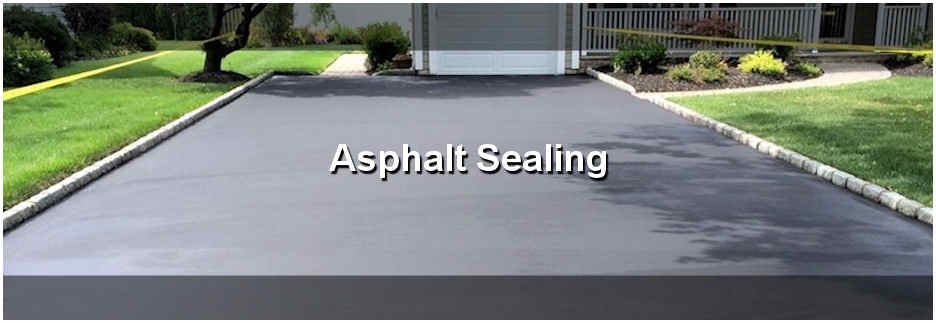Revitalize Your Residential Property with Regrading and Asphalt Sealing Strategies
Revitalize Your Residential Property with Regrading and Asphalt Sealing Strategies
Blog Article
Hot Mix Asphalt: A Lasting Solution for Pavement
Warm Mix Asphalt (HMA) has arised as a leading sustainable selection for sidewalk remedies, offering a myriad of ecological advantages and ingenious innovations. As the need for eco-friendly building and construction techniques grows, discovering the nuances of HMA's sustainability can provide valuable understandings into the future of sidewalk options.
Environmental Benefits of Hot Mix Asphalt

Furthermore, Warm Mix Asphalt helps to minimize urban warmth island effects. Its dark shade soaks up sunlight, decreasing the quantity of warmth mirrored back right into the ambience compared to lighter-colored pavements. This can lower ambient temperatures in urban locations, reducing the need for cooling and inevitably reducing power consumption.
Furthermore, Warm Mix Asphalt adds to boosted stormwater management. Its permeable nature allows water to charge and infiltrate the pavement groundwater products, minimizing runoff and the danger of flooding. These ecological benefits make Hot Mix Asphalt a sustainable choice for paving roadways and freeways.
Power Effectiveness in HMA Production
Is energy efficiency a vital consider the manufacturing of Hot Mix Asphalt (HMA)? Absolutely. Energy plays a significant duty in the manufacturing of HMA, impacting both cost and environmental sustainability. One vital element of energy efficiency in HMA manufacturing is using cozy mix asphalt (WMA) innovations (regrading). WMA enables the blending and placement of asphalt at lower temperatures compared to typical warm mix asphalt, leading to reduced power consumption throughout production. This procedure not just lowers gas usage but additionally decreases greenhouse gas emissions, making it an extra eco pleasant alternative.
In addition, improvements in plant innovations have caused more energy-efficient HMA production processes. Modern plants are designed with functions like recycled asphalt sidewalk (RAP) processing abilities, effective heater systems, and enhanced insulation, all adding to power savings. By enhancing energy usage in HMA manufacturing, the sector can decrease its carbon footprint while preserving top notch sidewalk products. Power performance is, therefore, a crucial consideration in making certain the sustainability of Warm Mix Asphalt manufacturing.
Recyclability of Hot Mix Asphalt
The recyclability of Warm Mix Asphalt (HMA) is a critical element of its sustainability and long-term environmental influence. HMA is among the most recycled materials in the United States, with over 100 million lots of reclaimed asphalt sidewalk (RAP) being reused yearly in brand-new pavement building and construction. Reusing HMA supplies numerous environmental advantages, such as lowering the need for virgin products, decreasing energy usage during production, and lowering the amount of waste sent out to land fills.
The procedure of reusing HMA includes grating the existing sidewalk, squashing it into smaller pieces, and blending it with new accumulation and asphalt binder to produce a recycled mix. This recycled mix can commonly perform in addition to and even far better than traditional HMA, while needing less resources and creating reduced greenhouse gas exhausts. By including RAP into brand-new pavement tasks, road agencies can save natural sources, lower prices, and decrease the environmental impact of road building and construction and upkeep tasks. Overall, the recyclability of HMA plays a substantial duty in promoting lasting techniques within the sidewalk market.

Long-Term Efficiency of HMA
Asphalt pavements demonstrate resilience and resilience over an extended duration, mirroring the long-lasting efficiency of Warm Mix Asphalt (HMA) In addition, improvements in HMA innovation, such as the use of polymer-modified binders and warm mix asphalt, have actually even more improved the toughness and longevity of HMA pavements. By prioritizing high quality building and upkeep practices, HMA proceeds to prove itself as a sustainable and cost-efficient service for lasting pavement facilities.

HMA: Toughness and Sustainability
Showing both longevity and sustainability, Hot Mix Asphalt (HMA) has become a cornerstone in the building of lasting sidewalk infrastructures - regrading. HMA's toughness stems from its capacity to stand up to hefty tons, severe climate condition, and high web traffic volumes, making it a reputable selection discover here for roads, highways, and flight terminal paths. The make-up of HMA, which generally includes accumulations, binder, and filler, plays Clicking Here an important function in enhancing its longevity and resistance to tear and wear
Moreover, HMA's sustainability depends on its recyclability and energy-efficient production process. The capacity to recycle reclaimed asphalt pavement (RAP) in new HMA combinations decreases the demand for virgin materials and lessens the environmental impact of pavement building and construction and upkeep. Additionally, the power effectiveness of creating HMA depends on its lower blending temperature levels contrasted to other sidewalk materials, bring about minimized energy intake and greenhouse gas exhausts.
Verdict
In conclusion, hot mix asphalt (HMA) uses a sustainable option for pavement with its ecologically pleasant attributes. HMA's recyclability, energy effectiveness in manufacturing, and lasting durability make it an environment-friendly choice for road construction.
HMA is one of the most recycled products in the United States, with over 100 million loads of redeemed asphalt sidewalk (RAP) being recycled yearly in new sidewalk building and construction.The procedure of recycling HMA involves crushing the existing pavement, squashing it right into smaller pieces, and mixing it with new aggregate and asphalt binder to produce a recycled mix.Asphalt pavements show durability and strength over a prolonged duration, showing the lasting performance of Hot Mix Asphalt (HMA) In addition, innovations in HMA technology, such as the usage of polymer-modified binders and warm Our site mix asphalt, have even more improved the toughness and durability of HMA pavements. The capability to recycle recovered asphalt sidewalk (RAP) in brand-new HMA mixtures minimizes the need for virgin products and decreases the ecological influence of sidewalk building and construction and maintenance.
Report this page